So, I don't know if you've heard about this but Todd Phillips - aka the guy who made The Hangover trilogy - and Joaquin Phoenix made a movie together. It's called Joker, and it's sort of their ode to Martin Scorsese, like, "What if the Batman villain Joker was more like Travis Bickle?" The plot: a mentally ill, aspiring stand-up comedian who struggles to tell the difference between his fantasies and reality inadvertently instigates a class war in 1980s New York Gotham City and scores a gig on his favorite talk show.
Poor thing has been flying a bit under the radar, though. Not easy to cut through the clutter these days, amirite? That's okay. Joker was really more of a passion project for them anyway. They only had a $60 million budget! If they're lucky, people will eventually find their way to Joker, especially a couple of months from now when Phoenix receives his inevitable Oscar nomination.
Wait. That's not right. What was the Vulture headline again?
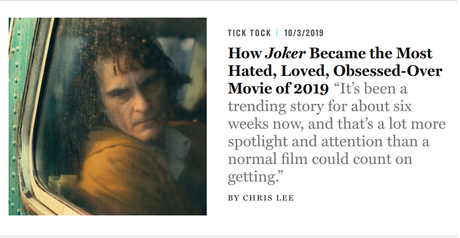
Oh, right. Right, right, right - this is the biggest movie of the year! From the second it debuted at the Venice Film Festival two months ago, Joker has become the cultural football of the moment, tossed around from one especially impassioned group to another. It's gotten to the point that some critics who filed negative reviews are now dealing with death threats, and the victims of the 2012 mass shooting event in Aurora, Colorado are engaged in a war of words with Warner Bros. over what kind of social responsibility it has as the studio which produced such a potentially violence-inciting film.
So, really, I shouldn't be making light of Joker's cultural moment, as I did in the intro. Theaters around the country are packing their lobbies with extra armed security to keep patrons safe. A week ago there was enough chatter on the dark web about a possible Joker-related theater-targeting in Texas that the FBI was enlisted to look into it. Cosplaying as the Joker has been banned at most theaters across the country. The film already possibly inspired a particularly malicious malware attack on millions of Android smartphones across the world. In the coming weeks and months, it is entirely possible that some violent event(s) will be blamed on Joker, albeit possibly as a convenient scapegoat in a maybe-this-will-reduce-my-sentence defense strategy.
The last time a movie managed to make people feel unsafe in a theater it was 2014's The Interview, and in that case, it was only because a foreign country had threatened attack on any theater which dared to show the film. Here, it's because a bunch of crazies online might feel activated by a comic book movie that celebrates the amoral philosophy of a loner.
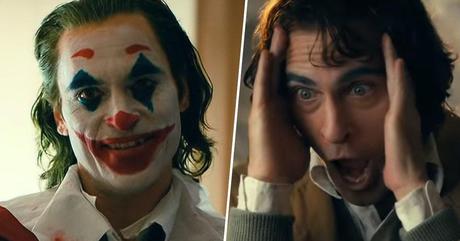
In light of all that, when we talk about Joker we're not talking about a movie; we're talking about gun control, mental health, the truly depressing rise of the incel movement and, more generally, what the hell the internet is doing to us as a people. We're going over every one of Todd Phillips' various defiant quotes with a fine-tooth comb and debating what it means to be a responsible filmmaker. Just as we did with Stanley Kubrick's A Clockwork Orange (1971) and David Fincher's Fight Club (1999), we're asking what level of culpability someone has for the effect their art has on the world.
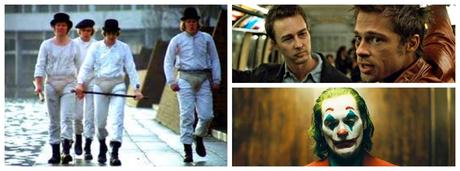
Now that the Joker is finally in theaters, however, we can finally talk about something else, like how it's actually a pretty shallow movie - gorgeously photographed by Lawrence Sher and anchored by Joaquin Phoenix at his most mesmerizing, but ultimately an empty experience in cinematic nihilism.
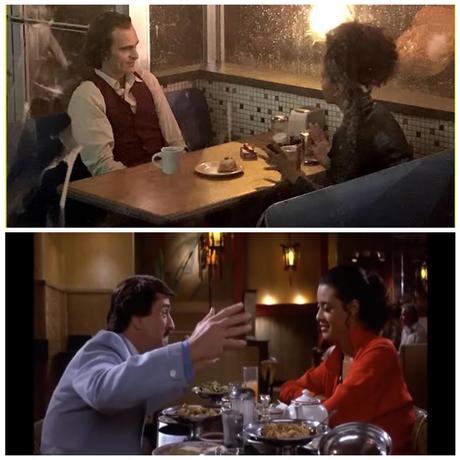 Joker vs. King of Comedy
Joker vs. King of Comedy Joker confirms the worst fears anyone had about the prospect of Todd Phillips using the Joker as an excuse to do his best Scorsese impression. Can The Hangover guy prove he has more depth? Or will he churn out something which apes the look and feel of Taxi Driver/ King of Comedy ( a film I profiled earlier this week) Scorsese but doesn't capture the soul? In other words, will he reveal himself to be a film bro, the type of fan who pledges fielty to Scorsese or Fight Club but doesn't put in the hard work of looking beneath the surface of any of it?
The answer to that last question, sadly, is yes. Joker wants so very badly to be about something but in the end when the titular character rejects any social ideology and declares that he cares about nothing you realize you've really just been watching a soulless impression of a "big, important movie." There is so much hand-waving toward hot button issues like mental health, civil unrest, class warfare, and Trumpian-era politics that there's practically a slight breeze coming off the screen, but none of it ever feels fully developed. It's a roadmap of the type of conditions that might produce a Joker but not a truly fleshed out universe/social commentary.
(Example: A 1% vs. 99% social movement wherein the blue-collar workers of the city take to the streets in clown masks explodes overnight simply because something the Joker did lead mayoral candidate Thomas Wayne to call poor people "clowns." It feels like they did A + B = C but forgot the actual "B" part of the equation.)
Moreover, while you want to believe Phillips meant to make a movie that disavows violence he sure seems to be reveling in it. Joker's first kill, for example, is immediately followed by the character performing a ballet-like dance in a grungy bathroom as the musical score swells in the background, the film elevating a clearly a cathartic moment for the character. His mother nicknamed him "Happy" as her positive spin on the psychological condition which forces him into sporadic bouts of uncontrolled laughter. He later admits, however, he hasn't had a single happy moment in his entire life that is until, of course, he kills a couple of Wayne-employee agro-bros who jump him in on the subway. After that, the man named Arthur Fleck is en route toward becoming Joker, and it frees him in ways he never could have expected.
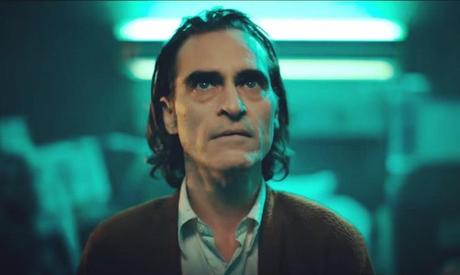
While Todd Phillips proves himself incapable of treating this journey with anything more than surface-level thrill, Phoenix is actually doing the heavy lifting of bringing this character to life. I'd give him the Oscar alone for what he does with his entire body every time his character suffers through his laughing spells. Covering his mouth doesn't help, neither does kneeling over or contorting his wafer-thin body any other way. By the third or fourth laugh, it begins to sound like he's choking, gasping for air in-between laughs. It's enough to make him cry and certainly enough to make us sympathize with him.
Heath Ledger's Joker was a chaos agent metaphor for Bush-era terrorism; Phoenix's version is pitched more toward our ongoing institutional and societal decay that leads to lone-wolf types repeatedly acting out in violence just to feel powerful over something. It's certainly a disturbing commentary, one which demanded to be treated with more thought, but with Phoenix at the center of it all, you always have something interesting to watch.
THE BOTTOM LINE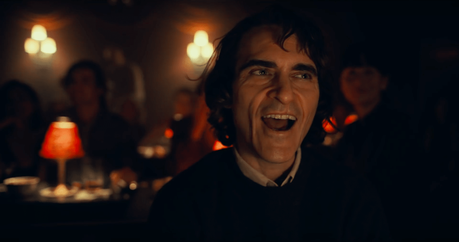
I am reminded of what Ethan Hawke said about Logan:
"Now we have the problem that they tell us Logan is a great movie. Well, it's a great superhero movie. It still involves people in tights with metal coming out of their hands. It's not Bresson. It's not Bergman. But they talk about it like it is. I went to see Logan cause' everyone was like, This is a great movie and I was like, Really? No, this is a fine superhero movie. There's a difference but big business doesn't think there's a difference. Big business wants you to think that this is a great film because they wanna make money off of it."
I disagree with his dismissal of Logan and the implied elitism of his comment, but I think he is right about the way big business works to elevate the ordinary just to make more money. It means something to present Joker to us as a breakthrough moment for the superhero genre because as far as theatrically-released movies go superheroes are about the only things that matter anymore. However, there's something depressing about that.
Joker gets points for being the most transgressive superhero movie ever released by a major movie studio, and Phoenix's Oscar buzz is well-deserved. The movie, however, is such an obvious, shallow imitation of Scorsese that you do want to scream, "You can't just drop comic book characters into cheap rip-offs of classics and call it a masterpiece!"
In a line tailor-made for all the trailers, the Joker ruefully declares, "I used to think my life was a tragedy; now, I realize it's a comedy." However, that's actually the central problem with Joker: the story of Arthur Fleck's mental deterioration should be a tragedy; in Todd Phillips' hands, it's an epic origin story. When Fleck falls away and Joker takes his place, the movie is pitched as if we should applaud, and I don't know that Phillips completely gets how weird we should feel about that. The fact that Phillips actually uses Gary "kiddie porn/accused rapist" Glitter's "Rock and Roll, Part 1 and 2" to underscore this moment gives the impression that he's just here to poke everyone in the eye.
RANDOM PARTING THOUGHTS- Due to the obvious King of Comedy comparisons, much has been made about Robert De Niro's presence in Joker as Arthur's favorite comedian/talk show host. Truthfully, his screen time is pretty limited, but as with The Irishman, this does appear to be De Niro returning to actually caring about acting again and not just going through the motions.
- MAJOR SPOILER: Seriously, how many times must we watch Bruce Wayne's parents die on film?
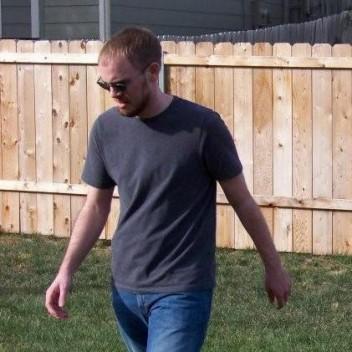
Grew up obsessing over movies and TV shows. Worked in a video store. Minored in film at college because my college didn't offer a film major. Worked in academia for a while. Have been freelance writing and running this blog since 2013. View all posts by Kelly Konda

